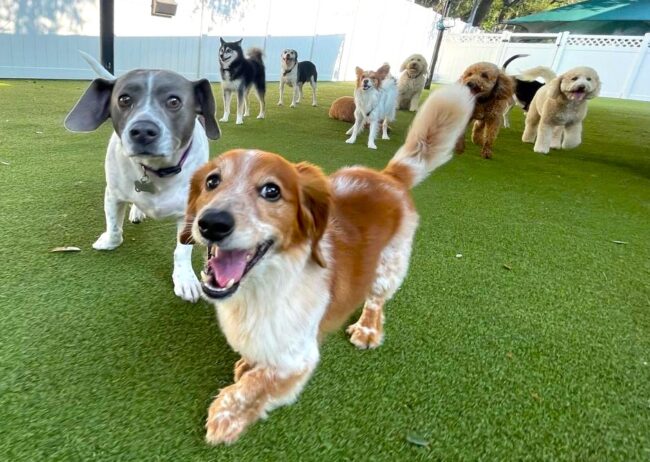
A lush, green lawn is a joy for homeowners, but for dog owners, maintaining a healthy lawn while keeping it safe for pets can be a challenge. Many traditional lawn care treatments contain chemicals that may be harmful to pets, making it essential to adopt pet-friendly practices. Additionally, pests like fleas, ticks, and grubs can threaten both your lawn and your furry companions. Implementing lawn insect control in Massachusetts is crucial for keeping your yard safe and enjoyable for both pets and people.
In this guide, we’ll discuss effective, pet-safe lawn care practices, how to manage pests naturally, and essential maintenance tips to ensure a thriving lawn.
1. Choose Pet-Safe Lawn Treatments
Traditional fertilizers and pesticides often contain harsh chemicals that can be toxic to pets. Instead, consider pet-friendly alternatives:
Organic Fertilizers
- Use natural fertilizers like compost, seaweed-based products, or manure.
- Avoid synthetic fertilizers containing high nitrogen levels, which can irritate pet paws and skin.
Natural Weed Control
- Vinegar-based solutions and corn gluten meal can suppress weeds without harming pets.
- Hand-pulling weeds is a chemical-free option for small areas.
Pet-Safe Insect Control
- Beneficial nematodes help eliminate grubs and lawn pests naturally.
- Diatomaceous earth (food-grade) can deter fleas and ticks without harming animals.
2. Implement Safe Lawn Insect Control in Massachusetts
Massachusetts is home to various lawn pests, including ticks, mosquitoes, and grubs. These pests can carry diseases and damage your lawn. Using lawn insect control in Massachusetts methods that are pet-friendly is essential for a safe outdoor space.
Tick and Flea Control
- Plant tick-repelling plants like lavender, rosemary, and lemongrass.
- Keep the lawn mowed short to reduce hiding spots for ticks and fleas.
- Create a mulch or gravel barrier around your yard to deter pests from migrating.
Grub and Beetle Prevention
- Use milky spore disease, a natural bacterial treatment, to target Japanese beetle larvae.
- Introduce beneficial nematodes to control grubs without toxic chemicals.
- Aerate the soil to reduce compacted areas where grubs thrive.
Mosquito Management
- Eliminate standing water to prevent mosquito breeding.
- Use citronella plants and essential oils as natural repellents.
- Install bat houses—bats are natural predators of mosquitoes.
3. Design a Dog-Friendly Lawn
Dogs love to run, dig, and explore, which can put stress on your lawn. Designing a pet-friendly yard can reduce damage while keeping your dog happy.
Create Play Zones
- Designate areas for play with durable grass varieties like Kentucky bluegrass or perennial ryegrass.
- Use mulch or gravel in high-traffic zones to reduce wear and tear.
Prevent Urine Spots
- Dog urine can create yellow or brown patches due to nitrogen overload.
- Water these spots immediately to dilute the nitrogen.
- Consider training your dog to use a designated area with pet-friendly ground cover.
Secure Fencing and Shade Areas
- Ensure your yard is fenced to keep pets safe.
- Provide shaded spots with trees or dog-friendly plants like clover to keep pets cool.
4. Safe Lawn Maintenance Practices
Regular lawn maintenance plays a significant role in keeping your yard safe for both pets and plants.
Mowing and Watering
- Mow your lawn at the recommended height (around 3 inches) to keep it healthy and resistant to pests.
- Water deeply but infrequently to encourage strong root growth.
Aeration and Dethatching
- Aerate the lawn at least once a year to improve drainage and nutrient absorption.
- Dethatch if the buildup exceeds half an inch, as excessive thatch can harbor pests.
Avoid Over-Fertilizing
- Excess fertilizer can cause chemical burns and harm pets if they ingest it.
- Stick to organic, slow-release fertilizers that are safe for animals.
5. Pet-Safe Pest Repellents and Barriers
While insecticides can be harmful, there are natural ways to keep pests away from your lawn without endangering pets.
Diatomaceous Earth
- Sprinkle food-grade diatomaceous earth around the yard to deter fleas, ticks, and ants.
- It is safe for pets but deadly for insects with exoskeletons.
Essential Oils and Herbal Sprays
- Use pet-safe essential oils like cedarwood, peppermint, and neem oil to repel pests.
- Avoid tea tree oil, as it can be toxic to dogs and cats.
Encourage Natural Predators
- Birds, frogs, and ladybugs help control insect populations naturally.
- Create a wildlife-friendly garden with native plants and birdhouses.
6. Seasonal Lawn Care Tips for Pet Owners
Each season in Massachusetts brings different lawn care challenges. Here’s how to adjust your routine:
Spring
- Rake up debris and leaves where pests may have overwintered.
- Apply natural fertilizers to promote growth.
- Begin lawn insect control in Massachusetts early to prevent outbreaks.
Summer
- Keep grass longer to retain moisture and protect pet paws from hot surfaces.
- Provide shaded rest areas and fresh water for pets during hot days.
- Monitor for signs of flea and tick activity.
Fall
- Reseed bare spots and fertilize with pet-safe products.
- Remove fallen leaves to prevent mold and pests from thriving.
- Consider using a protective ground cover in high-traffic pet areas.
Winter
- Avoid using chemical-based ice melts, which can harm pet paws and the lawn.
- Protect dormant grass by limiting pet traffic during frosty periods.
- Plan for early spring treatments to tackle any pest issues.
Final Thoughts
Maintaining a pet-friendly lawn requires a balance between effective lawn insect control in Massachusetts and safe lawn care practices. By using organic fertilizers, pet-safe pest control methods, and proper lawn maintenance techniques, you can create a safe, healthy outdoor space for both you and your pets. Whether you’re dealing with pesky fleas, damaging grubs, or stubborn weeds, choosing natural and sustainable solutions ensures that your lawn remains a beautiful and pet-safe environment all year round.
For expert advice and treatments, consider hiring a professional lawn care service specializing in pet-friendly solutions. A well-maintained lawn not only enhances your property but also provides a safe, enjoyable space for your four-legged family members.
